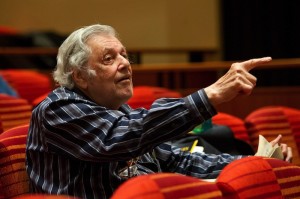Elsewhere I have written about Robert Mann’s extraordinary gift for teaching.
At 93, he remains the indefatigable teacher, still smiling and joyous. Indeed, if you didn’t know who he is, when he walks into a room, your first thought would probably be, “Why does this man seem so happy?” Soon it becomes obvious that there is a rare kind of balance at play here: accomplishment, family, and continuing curiosity about what is happening right now, especially as it relates to music.
All of this was on display this week at Manhattan School of Music’s Miller Recital Hall in the public master classes that were as part of the 3rd Annual Robert Mann String Quartet Institute. The other faculty for this project include David Geber, Nicholas Mann, members of the American String Quartet and Kazuhide Isomura, recently retired founding violist of the Tokyo String Quartet. Participants were also treated to a screening of Speak the Music: Robert Mann and the Mysteries of Chamber Music, a film by Academy Award winning director Allan Miller. The program concluded today with a public concert by the Thalia, Centre, Rosco, Omer, and Ariadne String Quartets.
Earlier this week, as I settled into my seat to listen, what struck me initially was a reminder of the staggering difficulty of successful music making within the string quartet genre. Everything – from articulation, balance, tempo choice, bow speed and musical intention – seems to be at odds with each other as you hear four musicians attempting to become one entity.
And then, with a few words from Mr. Mann or Mr. Isomura – nothing more than a verbal suggestion here or a physical gesture there – things began to blossom into something special.
“Try it a little faster. No, faster still.”
“Perhaps you could feel it in two: ‘One…., two…., one…, two…., rather than one, two, three, four.’
“More brusque! Have the courage to grasp the differences in character, and let the music be more meaningful.”
“Be more evocative here.”
“Don’t be afraid!”
“There is a difference between being quiet and being serene. There must be intensity here.”
“This music should have a sense of restlessness; it’s too stationary.”
My personal impressions of the day: The worst music making is cursed by routine and unconsciousness. Indeed, the real value in such a program is not unlike the ringing of a bell in a meditation as if to say ‘Wake up. What is happening right now?’ The music came alive at the points of curiosity. That is when the groups would relinquish “knowing” and replace their certainty with suddenly trying to find out what was hiding right in front of them. The best results appeared immediately after a fear had been overcome – something that was imposing itself on the music had to be removed. Only then could magic truly happen.
My favorite line of the day, and there were many worth remembering, could be paraphrased as, “While you’re making music, try to avoid having nothing happen.”
Good advice.
Video archives of past master classes can be found here.

